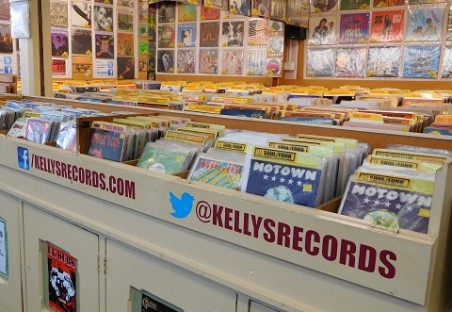The UK-based Support for Independent Retail campaign claims that for every pound spent online, only 5p makes it back into the local economy, whereas for each pound spent at a local business, the amount rises to 50p – 70p. So, although shopping online may give you more immediate savings, it may have a long-term impact on where you live.
However, buying online doesn’t have to mean giving your money to a multinational. Some local businesses are rising to the challenge by establishing their own online presences. Kelly’s Records, who have been selling preowned vinyl since 1969, have a traditional shop in the balcony of Cardiff Central Market, but also sell via their website.
They are also active on Twitter and Facebook, which they use for alerting customers about new stock.
But despite having a worldwide customer base, Assistant Manager Callum O’Connor says, “In-store sales still greatly outweigh online sales,” and estimates that only about 30% of Kelly’s business comes from online customers. He attributes their continuing success to a combination of loyal repeat customers and offering a specialist product.
UK online sales increased by 16% in 2015, and are expected to rise another 15% this year. There’s no denying the advantages of online shopping: it’s available 24/7 wherever there’s an internet connection, so shoppers aren’t dependent on store timetables or locations; compared to local shops, there are often more options available in terms of brands and prices; and more specialized items may only be available online.
It’s easy to see why online sales are rising, but what effect is their increasing popularity having on local economies? Can local businesses compete online as well? And will the advantages to buying from your local shops, such personal contact and the ability to see before you buy, be enough to keep in-store shopping healthy?


